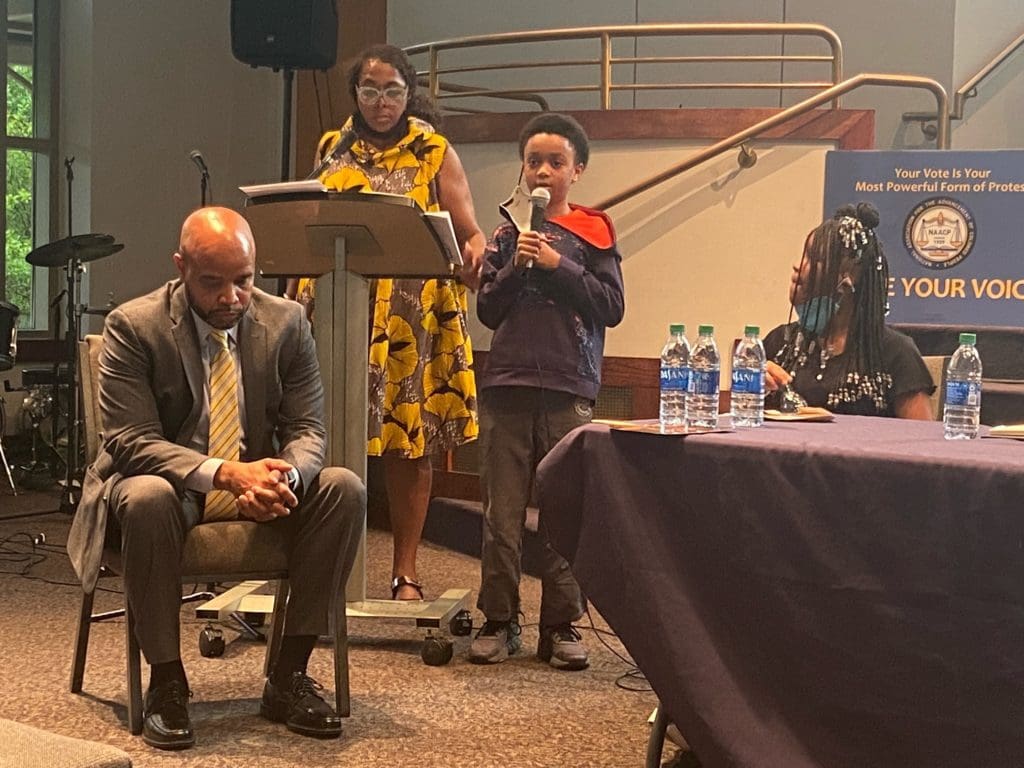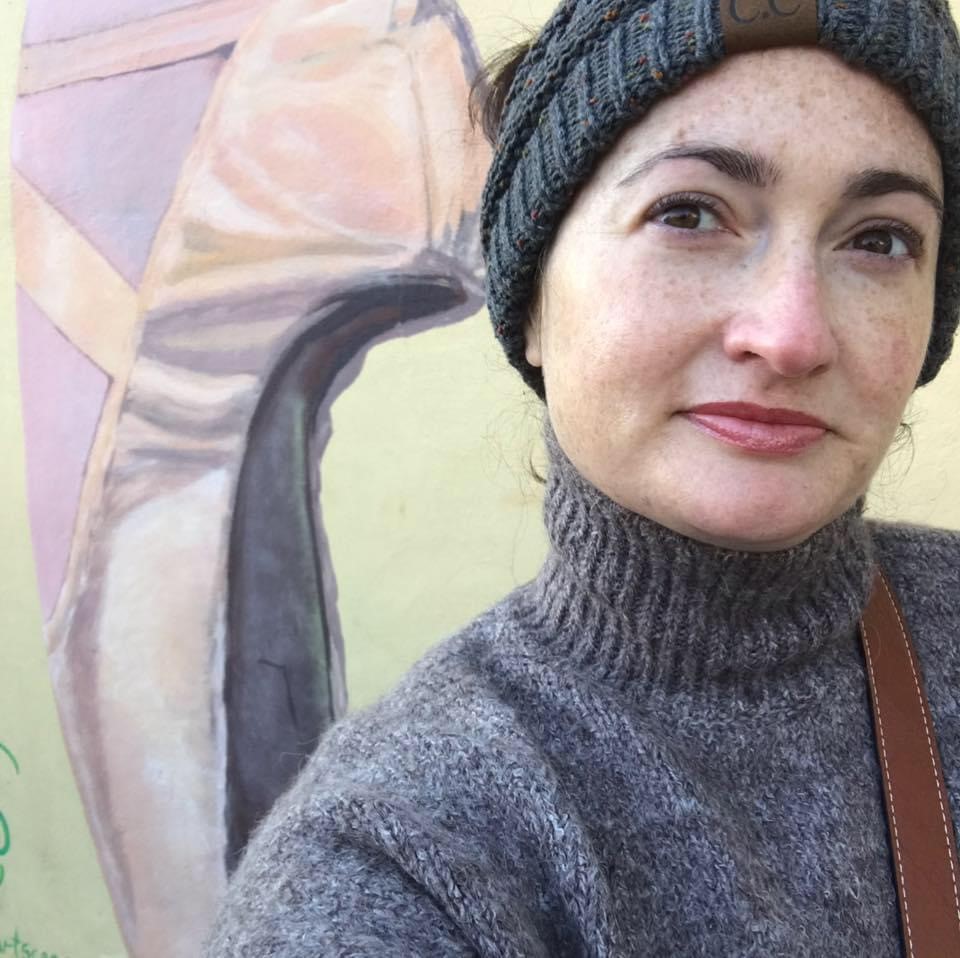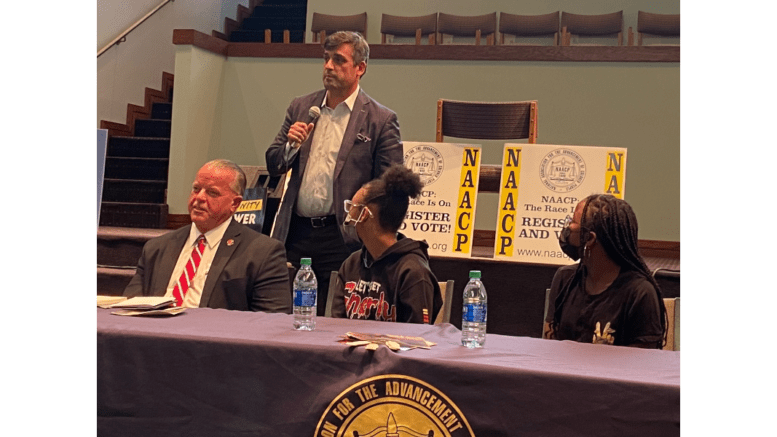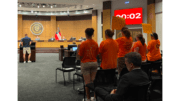By Rebecca Gaunt
Getting back to normal during a pandemic, with the Uvalde school shooting tragedy fresh on everyone’s minds, is no easy task for staff and students, as addressed in Tuesday’s Cobb County NAACP education forum.
Four students joined Cobb Schools Superintendent Chris Ragsdale, Marietta City Superintendent Grant Rivera, and Cobb Juvenile Court Judge Kareem West to talk school safety and the challenges of returning to in-person learning after years of disruption due to COVID-19.

Jeriene Bonner-Grimes, president of the Cobb chapter of the NAACP, moderated.
The students’ concerns started out as fairly commonplace, like the challenges of avoiding tardies while navigating crowded halls, and grew more intense with the prevalence of vaping, concerns about fighting, racial tensions, and unmet emotional needs.
Aniah Evans, a sixth grader at Tapp Middle School, said she is uncomfortable with the amount of touching taking place in hallways.
“We shouldn’t be able to put our hands on each other, and as much as teachers tell them to stop, they keep doing it and doing it and doing it,” she said.
Rivera responded later in the evening saying, “I heard tonight young ladies talk about unwanted touching that occurs at school, and I don’t want that for you. I feel like I owe you an apology…so the question becomes, when it’s brought to our attention, yes we have a moral and ethical responsibility to address it. The reality is, how much is occurring that we don’t even know about because kids have come to a place where they keep it to themselves. They don’t fully have trust in an adult with whom they can share. That’s what bothers me.”
Tyvionna Freeman, an eighth grader at Marietta Middle School, said it was hard coming back from three disrupted school years.
“I lost the end of my fifth grade year and sixth grade. Going back to seventh grade was very hard for me,” she said.
Highlights from the evening
Teacher burnout
Both superintendents were asked for three ways they are addressing teacher burnout.
Rivera touted being the first metro district to partner with Children’s Healthcare of Atlanta to train staff in resiliency and address emotions before burnout happens. The district also hired additional counselors, maintains a “culture that honors staff members as people before professionals,” such as free childcare on teacher workdays, and has extensive protocols for obtaining staff feedback, including Rivera meeting with teachers in small groups.

Ragsdale said he wouldn’t enumerate what he’s doing for teacher burnout, though he did mention recent raises and that Cobb is one of the highest paying districts in the metro area.
“We don’t have a teacher retention problem,” he said.
Parent Laura Judge pressed Ragsdale on retention versus burnout.
“The teachers are there, but the way they are reacting to the students is showing their burnout and their emotions…if you could go a little bit more in depth on that?” she asked.
“There’s not any more in depth. There’s not an answer, the answer, there’s not a silver bullet. It’s an awareness of teachers and the level of stress that they’re under, but at the same time they are in that classroom and they are there to do that job,” he said.
CARES Act funding
Both were asked how the districts used CARES Act funding and how much was left. Ragsdale said he wasn’t sure how much CCSD received and estimated it was about $160 million. He did not know how much was left. The district was able to hire an additional 30 school psychologists. A question from the audience later clarified that these psychologists would work directly with students in a counseling capacity, though the position often focuses on evaluations and paperwork related to special education.
He also mentioned summer learning programs and the online-learning platform CTLS.
“The pandemic hit and most schools were not in a position to be able to flip a switch and have digital online learning the next day. That’s the position we found ourselves in,” Ragsdale said.
Rivera said MCS received $27 million and funds were put toward staff bonuses, personal protective equipment (PPE), and hiring nearly 50 supply teachers to fill in when teachers were sick or quarantined. MCS also brought on more parent liaisons and doubled the number of social workers.
“For us, it’s about making sure we push in support as quickly as possible,” Rivera said.
Technology
Madison Drew, a North Cobb ninth grader, is frustrated with the continued reliance on technology, even as students return to in-person learning.
‘I think that computers are great and technology is amazing, but it’s only so far that it can reach, especially when I’ve been virtual for two years. I’m tired of always doing tests and quizzes on computers where I don’t understand,” she said.
Drew also said there have been times when tests have to be postponed because someone’s computer isn’t working.
“I asked a teacher if she could print something out and she never did because she said it’s on CTLS. Sometimes I can’t do it by looking at a computer screen. I need to actually feel it and write it down and say it out loud. That’s how it works for me,” she said.
Code Red Drills
Alex Judge, a student at Dickerson Middle School, spoke about the Code Red drill he had experienced earlier that day.
“When you’re in a Code Red drill, they have somebody walk down the hallway and rattle the knob, which kind of gets me every time,” he said. “I think it’s a good thing. It teaches us what to do in an actual emergency, but it is pretty scary.”
Ragsdale told the audience, “It’s a different day. Education is different. These kinds of situations are unfortunately here to stay…we cannot get complacent.”
Rivera said, “We have to overreact to student safety…but we also have to be sensitive to how is this creating trauma that layers upon trauma from the past 18 months.”
Judge received applause from the audience when he requested “more helpers in the school” instead of people with guns.
Discipline
Rivera said that with the return to in-person learning, staff have seen more emotional outbursts in elementary kids and fighting in the older set, but the aggressive behavior seen last year has significantly improved.
Both were asked how they intend to address the disproportionate number of Black and disabled students who face exclusionary discipline such as suspension and expulsion.
Rivera said it was important to acknowledge subjective and objective discipline. Whereas a fight might be a clear cut infraction of the disciplinary code, being “disrespectful” can be perceived differently by different people.
MCS is taking a proactive approach with counselors working with small groups to head off problems, and restorative action where an expert sits down with students to settle issues, typically in grades 6-12.
Ragsdale acknowledged the problems with removing students from their learning environments, but also recognized the difficulty of teaching a class with constant disruption.
“Everyone has the same student discipline code. However, there is a level of autonomy for schools, ie, principals and admin teams. Some of those principals and admin teams deem to make certain offenses more or less weighted. It’s based on their school’s community and the input that those teachers provide to that admin team,” he said.
Ragsdale also said fighting was down 25% from last year.

Rebecca Gaunt earned a degree in journalism from the University of Georgia and a master’s degree in education from Oglethorpe University. After teaching elementary school for several years, she returned to writing. She lives in Marietta with her husband, son, two cats, and a dog. In her spare time, she loves to read, binge Netflix and travel.




